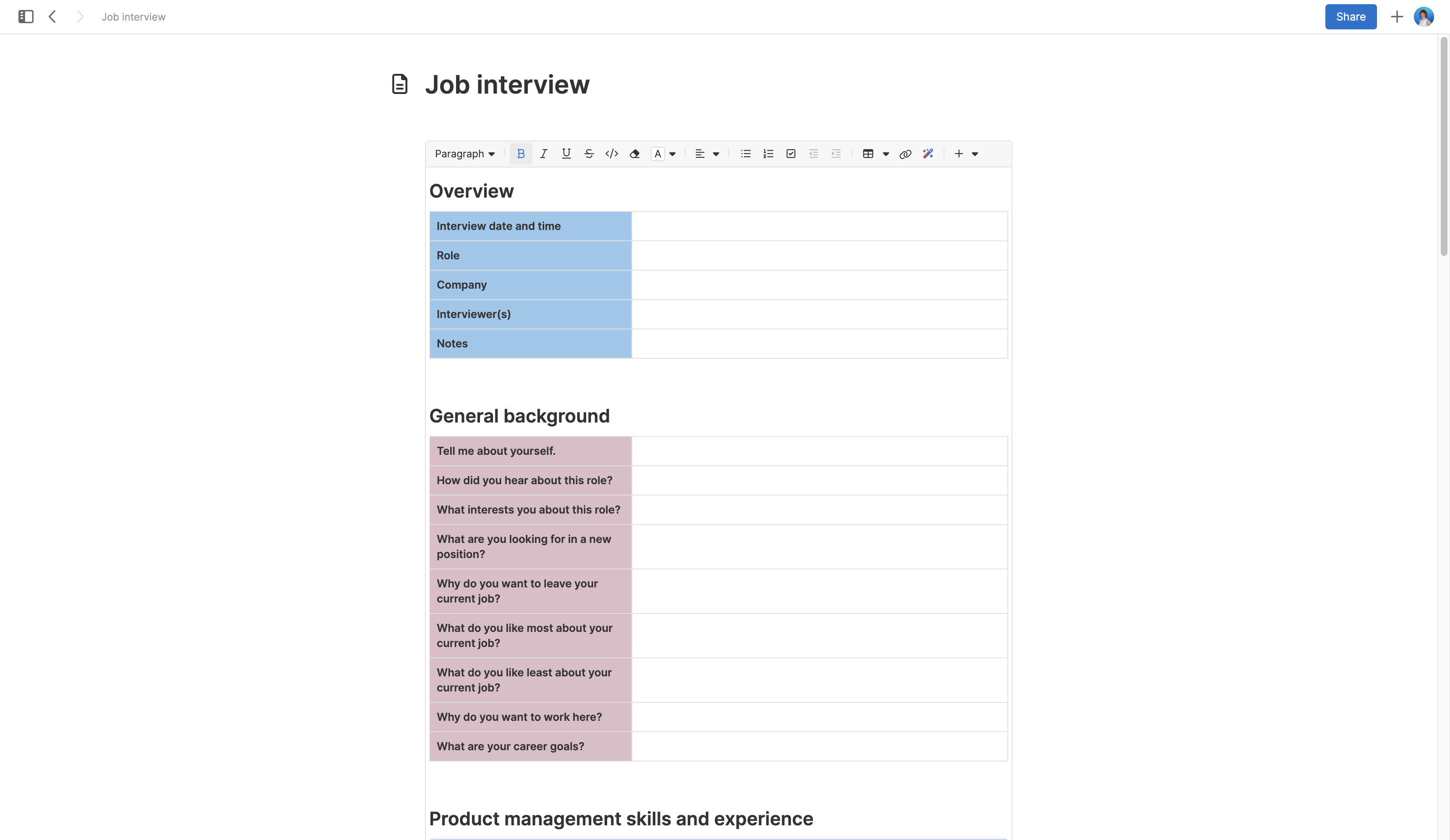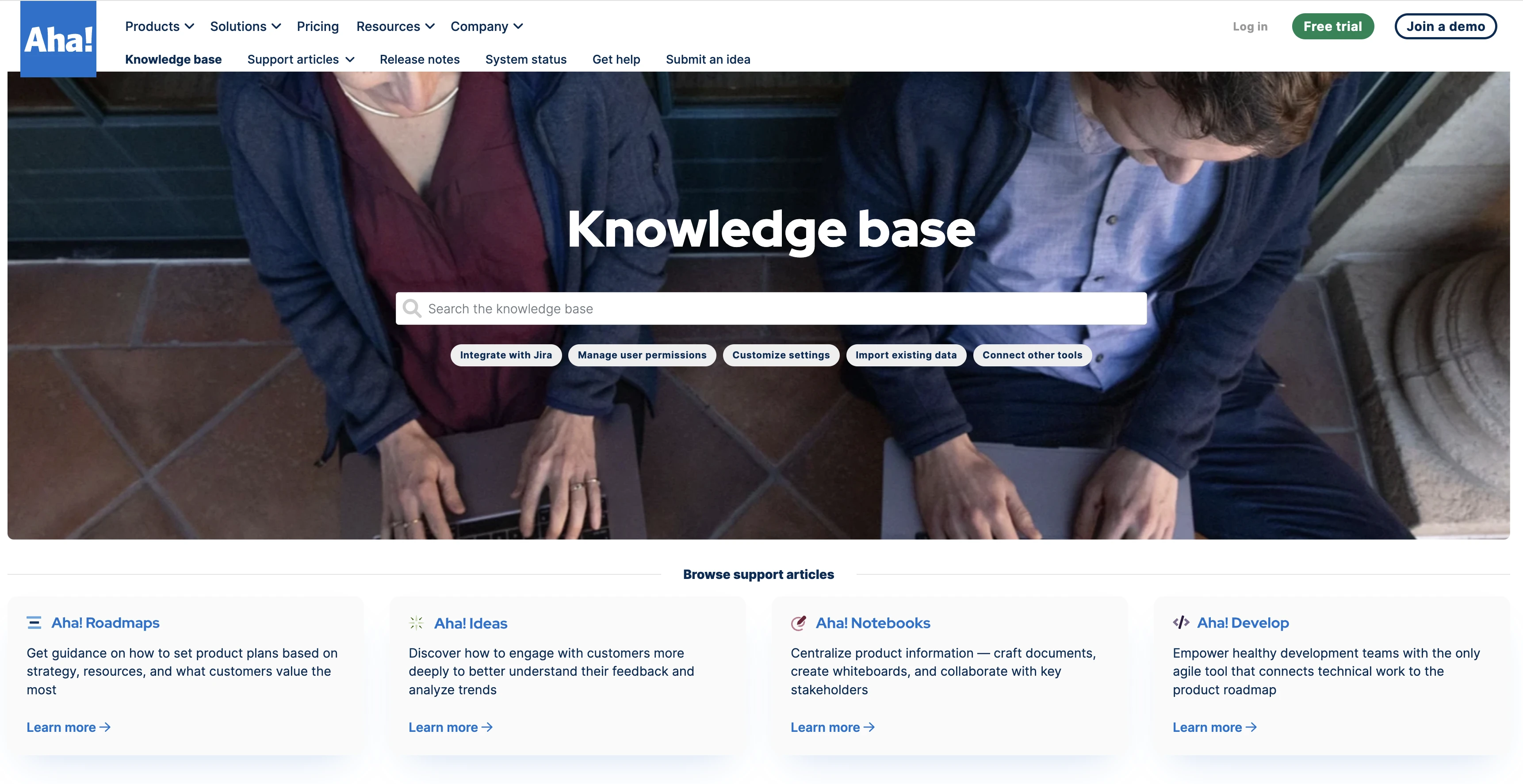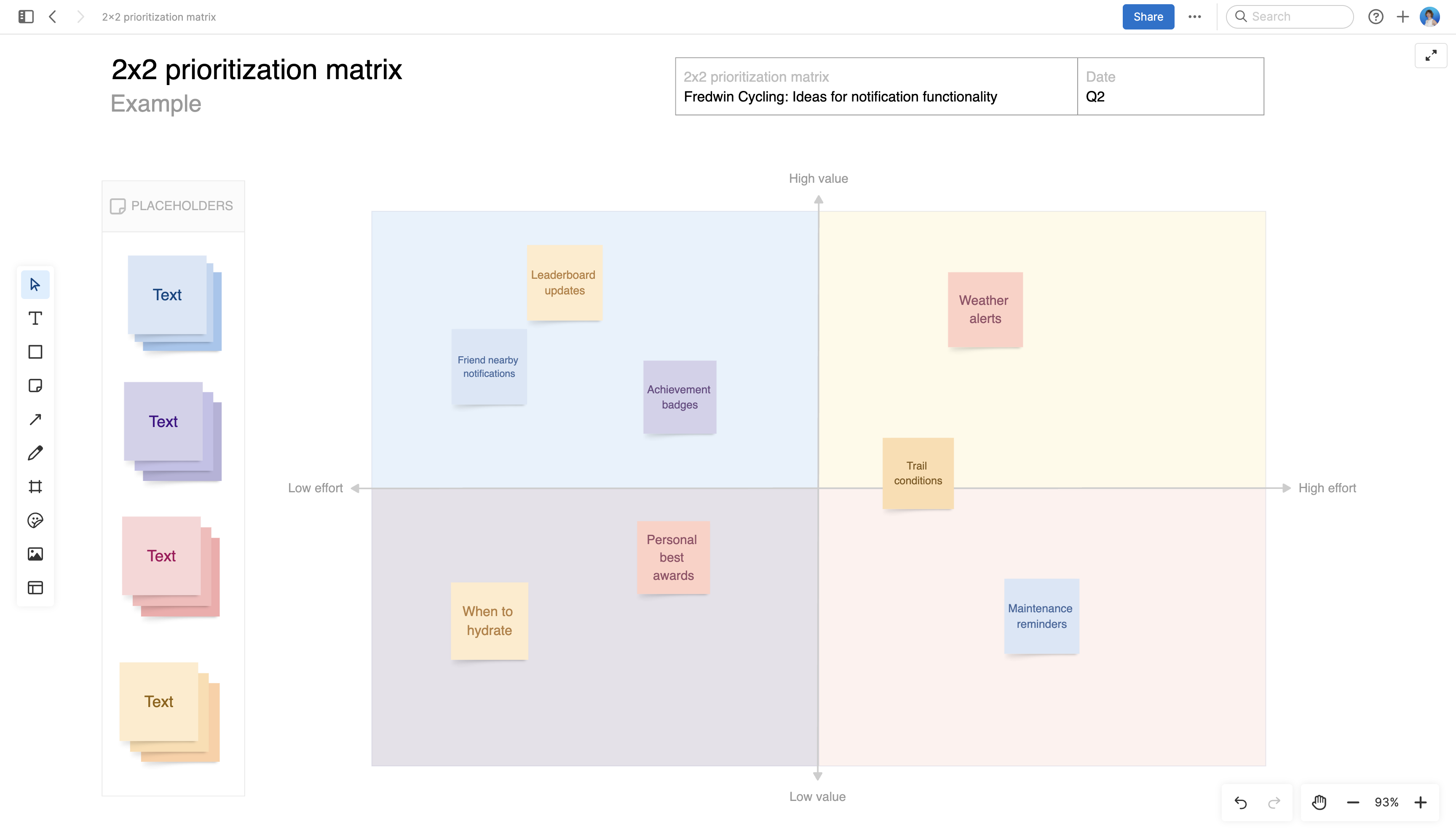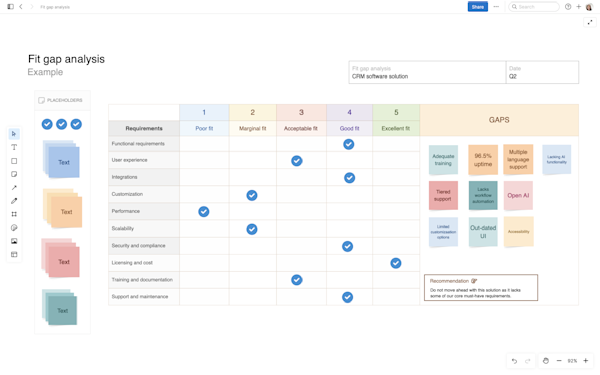
And remember that an interview is bi-directional. This is also your opportunity to evaluate the company, team, and position so you can decide whether or not to accept an offer.
You can jump ahead to each product manager interview tip here:
(Plus, download the product manager interview tracker template.)
10 product manager interview tips
There are two main types of interviews you are likely to encounter: behavioral (most common) and case-style (mainly used by large enterprises for early-round screening). Here are some quick definitions:
Behavioral interviews: These product manager interview questions often center on your background, prior job experience, and how you have used your skills to succeed in the past.
Case-style interviews: These questions test your creative thinking and problem-solving by asking how you would approach a specific, often imaginary, scenario.
Both types have their benefits. But interviewers generally give more weight to answers that product manager candidates give during a behavioral-style interview because they draw out real-world experience. For example, we prefer to conduct behavioral interviews for product roles at Aha! We believe past performance is an excellent indicator of future behavior. We also find that behavioral questions keep conversations grounded in real examples rather than hypotheticals.
Related:
The tips in this guide are geared primarily toward behavioral interviews. However, many of them should help you study for case-style interviews, too.
Now that your product manager interview is scheduled, let's focus on how to get ready for the next step.
1. Research deeply
Learn everything you can about the company, its product or portfolio, and the people you will speak with throughout the interview process. Seek to understand the problems it wants to solve. Study its customers and competitors, and note which technologies it uses to build and support its products. This can help frame your responses to interview questions.
For example, knowing whether its product is B2B or B2C can help you give a more relevant response about developing product strategy — because the way organizations serve these markets will differ. Some companies might even ask how you would improve its products (similar to a miniature case-style interview). Research is the surest way to find the biggest hints.
Several good places to conduct your research include the company's:
Website
Blog and social channels
Support channels
Recent launches
And if one is available, sign up for a free trial for a firsthand look at what it offers.

2. Align your experience
Closely examine the job description of the role you applied for. Which of your skills and experiences are the most pertinent? Considering this will help you anticipate questions and prepare thoughtful answers.
This is especially valuable if you are breaking into entry-level product management roles or transitioning from another discipline. For example, if you are early in your career, you might want to highlight product-related coursework or certifications. Or if you are an engineer making a career switch, talk about how your unique development perspective will help you make thoughtful decisions as a product manager.
Bonus tip: Quantifiable results and accomplishments are always more impactful than a laundry list of projects you worked on.
Related:
3. Look inward
Now that you have researched the company and role, pause for introspection. Most interviewers will ask some variation of the same question: "Why do you want to work here?"
A vague reply about "seeking new opportunities" is unlikely to inspire. And interviewers certainly do not want to hear your grudges against past employers. Instead, be specific:
Demonstrate your values, showing how they align with the company's values. The research you did earlier will help you here.
Discuss your goals for the role, should you earn it — convey these with energy.
Share what you hope to learn. A passion for continuous improvement is a common and sought-after soft skill that indicates you have a growth mindset.
Show that you are invested. Be enthusiastic about the role as well as the company's culture, mission, and customers.
Looking inward can also help you clarify the type of company you want to work for, so you know what to ask and listen for during your interview. In turn, you can find out if the opportunity truly aligns with your interests.
Related:
4. Get familiar with typical questions
Product manager interview questions vary, but they tend to cover similar themes (including your general background, past experience, and cross-functional leadership skills). Our job interview template is a simple way to get familiar with these topics. It includes 45 practice questions and space to write out responses.
You can also try different product manager interview question frameworks to help formulate well-rounded answers:
DIGS |
|
EAST |
|
Rule of threes |
|
SPADE |
|
STAR |
|
These are just a few interview question frameworks. Remember that top tech companies and product manager interviewers are increasingly using those that emphasize structured thinking, customer-centric design, and strategy. For example:
EAST is popular for companies focused on drawing out an applicant's strengths in product design and prioritization.
SPADE is common when an organization needs candidates to demonstrate their ability to assess options and make strategic decisions.
STAR is widely used by interviewers to draw out structured answers that directly highlight the impact a candidate has had in previous roles.
5. Prep your questions for the interviewer
Good product managers are fully immersed in the company strategy and lead the product team to greatness. To be able to achieve this, ensure the organization and product itself are both things you feel driven to support.
Know that you are interviewing the company, too. This is your chance to see how the product development team works and if it truly upholds its values. Prepare questions to ask your interviewers about leadership, processes, and what it is really like to work there. Their responses can clue you in on whether there is mutual alignment. As a plus, asking thoughtful questions like this demonstrates your curiosity — a core trait of excellent product managers.
Related:
6. Practice with mock interviews
What works on paper does not always hold up when spoken aloud. It is always a good idea to practice your responses verbally, and ideally with another person.
Here are a few ideas to help:
Try reaching out to product builders in your network. Ask if they would be willing to do a mock interview with you. You will likely find folks who are happy to help and share their expertise. Welcome any feedback they give to help you improve.
Seek advice through other channels. Check Reddit threads, LinkedIn groups, podcasts, and product management-focused guides and newsletters.
Record yourself. When you listen to the playback, you can identify filler words to avoid, assess your pacing, and recognize where there is room to strengthen your storytelling or more clearly communicate complex points.
7. Get out your notebook
Keep track of your thoughts before, during, and after your interview. In addition to writing out answers to practice questions, it is smart to have a physical or digital notebook handy while interviewing so you can:
Jot down the question being asked and provide an on-topic response.
Document any details the interviewer shares about the role, team, and product to review later.
Remember follow-up information so you know what to expect if you move forward.
If you are in the middle of multiple interview processes with several different companies, it may be worth opting for a digital notebook. That way, information is easily searchable and organized in one place.
8. Prep a whiteboard
You might be asked to work through a problem or exercise during a product manager interview. If you have the opportunity to employ an aid like a whiteboard, take it.
Digital whiteboard diagrams can help you articulate abstract concepts visually and in a way others can clearly understand. Using an interactive tool like this can also highlight your creativity, critical thinking, and ideation — all while making your responses more engaging for the interviewer.
Depending on the tool you use, some whiteboard templates can even aid in demonstrating your knowledge of product management concepts. For example, you could use a 2x2 matrix template to show how you might prioritize features to build. Guided templates can also help keep your narrative focused so you can avoid trailing off into tangents. You can explore some popular product management whiteboard templates here.

9. Find the right mindset
Breathe, meditate, hydrate. Explore ways to stay calm and confident throughout your interview. Acknowledge that you might not ace every question. (And remember that is OK.)
Product managers are no strangers to complex challenges. Your disposition alone can help you in landing the role. By showing that you can remain focused and collected in the face of adversity, you signal to the interviewer that you can handle this dynamic, challenging role.
Also, remember that you do not need to respond to every question right away. It is always acceptable to say, "That is an interesting question. Can you give me a moment to think through my answer?" before you start talking. Most interviewers would much rather hear a thoughtful response than the very first idea that comes to mind.
10. Keep track of each interview
Thousands of product manager jobs are available, and the number grows every year. You might go through multiple interviews before finding the right fit.
As you move through this process, keep track of interview dates and times, interviewer names and contact information, and the status of each interview. You can also note the specific questions you have for each interviewer, plus ideas for improvement when interviews do not go as well as you hoped. Download the free interview tracker Excel template below to get started.
Product manager interview tracker template
With these tips in mind, you will be equipped to tackle any product manager interview with poise and courage. Embrace your unique set of talents and let them shine. Best of luck.
FAQs about how to prepare for a product manager interview
How can I demonstrate my problem-solving skills during a product manager interview?
Clearly explain your approach to breaking down complex challenges, evaluating options, and making decisions. Point to a few real examples from your past experience in product management or other related roles. This will give your interviewer a good understanding of how you analyze issues, create solutions, and deliver results.
This is my first time interviewing for the role of a product manager — where should I start?
Make sure you study and understand core product management concepts such as product development methodologies and frameworks, product design, prioritization, and customer focus. Because you have no prior experience in this specific role, leverage any existing skills and relevant knowledge from related roles you have held, such as software engineer or product marketer. Ahead of your interview, learn everything you can about the business, product, and customers.
How can I make a strong impression during my product manager interview?
Showcase your understanding of user needs and the company's specific business goals. Share detailed examples of the impact you had in previous roles, and ask insightful questions about the company's products and roadmap to show your genuine interest in the role. Throughout the interview, strive to be clear, concise, and confident in your answers.



